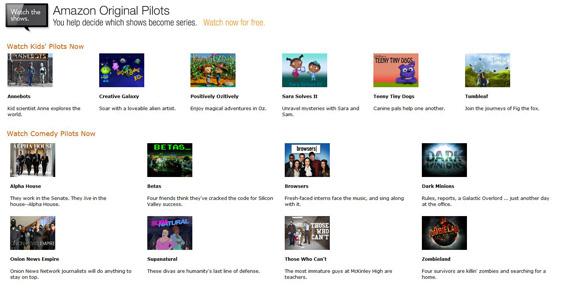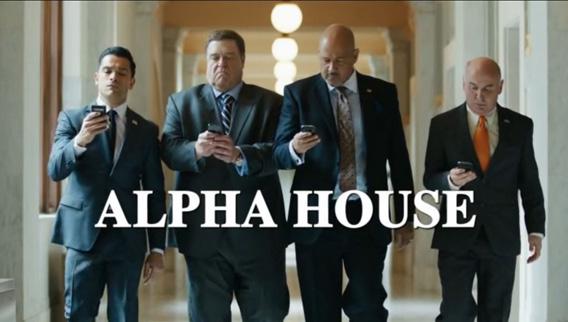Last Friday, when Amazon made 14 original TV pilots available for free viewing on its streaming video service, it launched an experiment that could do to TV production what the Internet juggernaut did to the book trade. The polite business term is disruption, but that’s not the word people whose bookstores were put out of business use.
The traditional method network executives employ to decide which pilot episodes to order as series is shrouded in mystery. It appears to be a highly scientific process involving gut feelings, Q scores, ratings trends, and clairvoyance—really, we know more about the papal conclave than how Zero Hour got greenlighted. Amazon, on the other hand, is crowdsourcing the decision.
After watching the Amazon Studios pilots—six kids’ shows and eight comedies—viewers are asked to rate them. There are straightforward questions about likeliness to watch again or to recommend the show, and more specific queries about things like script and acting quality, concept and setting. There’s even room for viewers to tell Amazon exactly which parts they liked and disliked. According to an interview Amazon Studios head Roy Price gave to TV Guide, the company will combine this feedback with data they’ll gather about how many people watched (and how many watched all the way through), social-media metrics, and input from offline focus groups to decide which of the shows deserve a 13-episode season, which will then be streamed via Amazon. What’s absent from this calculus, of course, is the judgment of development executives, traditionally the final decision-makers, whose hunches about which female lead is the sexiest and which laugh track needs sweetening are gospel in the TV development process.
The initial batch of eight comedies is a diverse bunch—six live-action, two animated; one musical, one zombie action-fest; one set in space, one in a low-rent shopping mall; several filled with familiar faces, a couple whose stars have nothing else listed on their IMDb pages. Still, there are some commonalities, the most striking of which is that all of them are vulgar enough to make David Milch blush. I started to wonder if Amazon was paying a bonus for every Class 1 profanity during Bill Murray’s cameo in the political sitcom Alpha House: In a 57-second appearance, he drops no less than a dozen F-bombs.
All the pilots have the look and feel of “real” TV shows, but Alpha House is the most polished. Headlined by John Goodman, it boasts the best acting, the best cameos (Murray and Stephen Colbert), the best creative pedigree (it was written by Doonesbury’s Garry Trudeau), and the sharpest premise—four Republican senators share a house on Capitol Hill. (Disclaimer: Slate is the online home of Doonesbury.) The episode does what pilots are supposed to do: It introduces the characters, gives them identifying characteristics (one’s lazy, one’s shady, one’s randy, and one’s unworldly), and leaves viewers dying to know what happens next. It’s cynical and smart, and it would be great counterprogramming to HBO’s Veep.
The eight pilots also share a strong sense of place—and if Alpha House’s signature fragrance is cherry blossoms and smoke-filled rooms, Betas, set at a Silicon Valley startup, gives off a convincing whiff of Cheetos, cold pizza, and Adderall. But this story of tech entrepreneurs looking for VC funding could never air on network TV—and not just because of the porn, swearing, and light Japanese bondage. The nets would pass because it has no stars (Ed Begley Jr., that guy from The L.A. Complex, and a cameo by Moby notwithstanding), and the female roles are as underdeveloped as Ed Begley Jr.’s sashimi-slicing skills. Worse, it’s hard to shake the feeling that the inexperienced writers have now exhausted their stash of ideas and their trove of tech-speak. (There are only so many times you can deliver lines like “I smoke-tested the build last night, and it bricked my phone” with a straight face.) The pilot is entertaining enough, but like one of the apps in the show, it doesn’t seem scalable.

Courtesy of Amazon Originals
TV episodes should be like french fries—one is never enough—but with a lot of these Amazon pilots, a single serving was sufficient. Browsers, a musical about a new crop of interns at a Huffington Post-like website, features talented performers and witty direction (when the new arrivals slap down their IDs at the security desk, the photos on their driver’s licenses take over the singing), and it’s great to see tweeting and link aggregation taking their place in the pantheon of musical-theater song topics. (I especially liked Bebe Neuwirth as the head of the Daily Gush, singing “I am someone with whom not to fuck.”) But the plot was so feeble—when one of the interns gets fired, another asks the boss to reinstate him—it’s hard to imagine what low-stakes exploits subsequent episodes might involve. (Don’t suggest a coffee run; they used that in the pilot.)
Similarly, one episode of Those Who Can’t, about a trio of immature teachers, was plenty, and I was satiated with 25 minutes of Dark Minions, an animated tale of losers in space written and voiced by John Ross Bowie and Kevin Sussman—Kripke and Stuart the comic-store guy, respectively, on The Big Bang Theory. I’m also done with Onion News Empire, a cable news workplace comedy that earned credit for casting Jeffrey Tambor and finessing a subtle Larry Sanders Show laugh line, but lost many more points for faux-edgy jokes about pedophiles, rape, and suicide bombers.
I’m on the fence about the last two shows. Zombieland has slick special effects and gore a-plenty, and since it’s a continuation of the 2009 movie of the same name—identical situation and characters, albeit with no-name actors—it’s a familiar concept. But if you’ve seen the movie, you already know the pilot’s tricks—rules for post-apocalyptic living, the zombie kill of the week—and if you haven’t seen it by now, chances are you don’t care for zombie comedies. The formula for Supanatural, an animated comedy about a couple of demon-hunting mall-workers, is Scooby Doo meets Buffy meets Mall Cop meets Real Husbands of Hollywood. It’s the only one of the pilots with true female leads, and it’s the only one with a black woman front and center. Unfortunately, the other lead is a white character who “talks black,” a cultural tightrope the show isn’t nearly deft enough to navigate.
Based on these eight pilots, network development staffs needn’t worry about meeting the same fate as Borders sales associates just yet. Besides, Netflix has server farms full of data about its members, and it just released 13 episodes of the dreadful Hemlock Grove, which the AV Club’s Zach Handlen described as “a pulsating pus-ridden boil.” Still, data has already transformed everything from electioneering to sweatshirt manufacturing. If I were a network honcho, I’d be watching Amazon’s experiment carefully—and thinking hard about whether it’s a good idea to add that second Jacuzzi on the deck.
